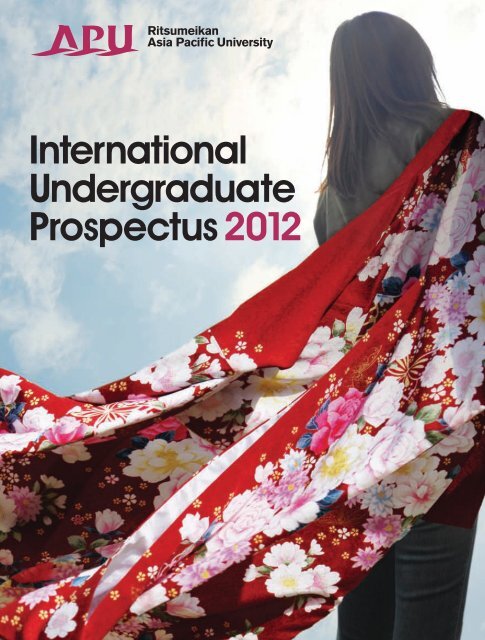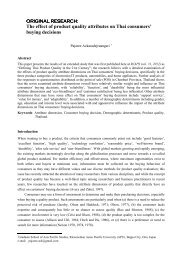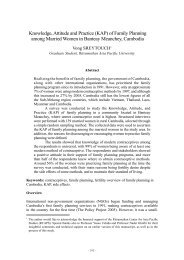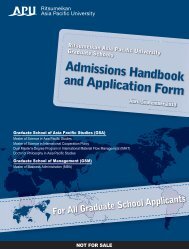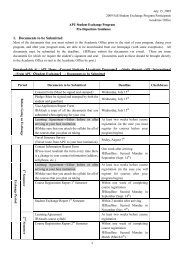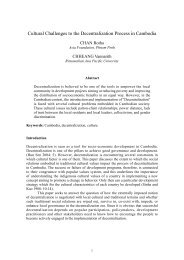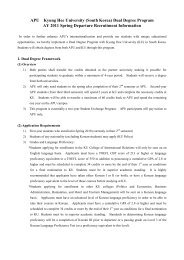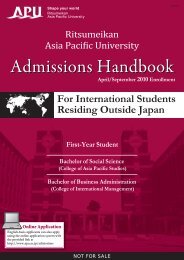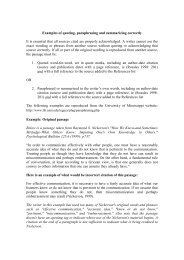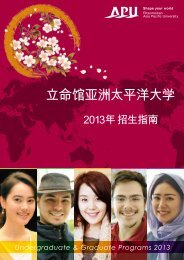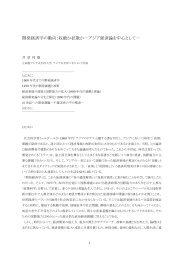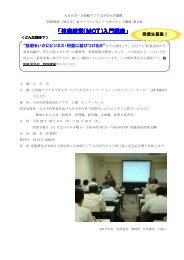International Undergraduate Prospectus 2012 - APU Ritsumeikan ...
International Undergraduate Prospectus 2012 - APU Ritsumeikan ...
International Undergraduate Prospectus 2012 - APU Ritsumeikan ...
You also want an ePaper? Increase the reach of your titles
YUMPU automatically turns print PDFs into web optimized ePapers that Google loves.
<strong>Ritsumeikan</strong><br />
Asia Pacific University<br />
<strong>International</strong><br />
<strong>Undergraduate</strong><br />
<strong>Prospectus</strong> <strong>2012</strong>
Contents<br />
02 Message from the President<br />
04 Why Japan<br />
06 Why <strong>APU</strong><br />
08 A Unique Education System<br />
10 APM - Bachelor of Business Administration<br />
12 APM - Curriculum<br />
14 APS - Bachelor of Social Science<br />
16 APS - Curriculum<br />
18 Language Education<br />
20 Active Learning<br />
22 Exchange Programs<br />
24 Career Success<br />
26 Beppu City<br />
28 State-of-the-art Campus<br />
30 Accommodation<br />
32 Student Life<br />
34 Clubs and Societies<br />
36 Events on campus<br />
38 Events off campus<br />
40 Admissions Guide<br />
42 Scholarships and Fees<br />
<strong>APU</strong> - 01
Welcome<br />
to <strong>APU</strong><br />
Your student life at <strong>APU</strong> is the beginning of a very<br />
exciting and challenging international journey.<br />
Our wonderful campus, overlooking the Pacific<br />
Ocean, is in every way a global village offering<br />
a unique opportunity to interact with teachers<br />
and classmates from all over the world. Through<br />
four years living and studying with us, and getting<br />
involved in various events and activities, you will<br />
be taking your first steps into the wider world as<br />
a global citizen.<br />
We are now entering an historic era where the<br />
Asia Pacific is beginning to lead the way in terms<br />
of global trends and policies. Japan is well known<br />
as the economic and technological pioneer of<br />
the region, with a long history and colorful traditions<br />
and Kyushu will continue to play a big part in the<br />
region’s future as the country’s bridge to the rest of<br />
Asia. <strong>APU</strong> is therefore at the center of this dynamic<br />
shift and ideally placed to create leaders for<br />
tomorrow’s world. I urge you to take advantage of<br />
the wisdom and knowledge available from Japan’s<br />
most international of universities, and I look forward<br />
to welcoming you here at <strong>APU</strong>.<br />
Professor Shun Korenaga<br />
President, <strong>Ritsumeikan</strong> Asia Pacific University<br />
Vice-Chancellor, <strong>Ritsumeikan</strong> Trust<br />
02 - <strong>APU</strong>
<strong>APU</strong> - 5
Why Japan<br />
<strong>APU</strong><br />
Job Opportunities<br />
Japan has one of the biggest economies in the<br />
world with businesses and organizations all over the<br />
globe. There is therefore a great deal of opportunity<br />
for international students with a good knowledge<br />
of Japan, the language and the culture to act as<br />
a bridge for these companies and organizations<br />
either in Japan or in various other countries.<br />
Learn Japanese<br />
Studying a foreign language in a university in<br />
your own country does not always mean that<br />
you will be able to speak, understand and use<br />
it. At <strong>APU</strong> you have the opportunity to become<br />
fluent in Japanese. Immersed in the culture of<br />
Japan, you can put your new language skills to<br />
use on a daily basis with new friends and in new<br />
environments. Many regard Japanese as a very<br />
difficult language but it is actually relatively simple<br />
to speak and understand. Of course, reading and<br />
writing is quite a challenge but that is where <strong>APU</strong>’s<br />
education system gives you the extra boost you<br />
need to master this wonderful language.<br />
If you’re<br />
looking for an<br />
international<br />
experience or<br />
an international<br />
career, I think<br />
<strong>APU</strong> is a great<br />
place to study.<br />
Abdoulaye - Mali,<br />
Graduate,<br />
Production Planner,<br />
Nissan Motors<br />
04 - <strong>APU</strong>
Friendly & Safe<br />
Japan’s strong economy, combined with<br />
a culture that places a great deal of<br />
importance on respect for others, is what makes<br />
it one of the safest countries in the world. For<br />
international students, it is an ideal environment<br />
to live and enjoy studying overseas. It would not<br />
be unusual at all for you to misplace your wallet<br />
in a crowded urban area and have it returned<br />
to you within a day with all the money and<br />
cards where you left them.<br />
Rich Culture<br />
Japan has a long and rich history and is a diverse cultural mix of East<br />
and West, old and new and natural and artificial. After having gone<br />
through various stages of development, Japan’s unique and versatile<br />
culture is what has seen it emerge as a world leader in terms of economy<br />
and technology allowing for countless opportunities for <strong>APU</strong> graduates.<br />
<strong>APU</strong> - 05
Why <strong>APU</strong><br />
53%<br />
Japanese<br />
47%<br />
<strong>International</strong><br />
A Truly <strong>International</strong><br />
Environment<br />
Study in English<br />
<strong>APU</strong> is the only university in Japan that offers<br />
all undergraduate programs in English and<br />
Japanese. There is therefore no need to know<br />
any Japanese to gain admission. English speaking<br />
undergraduates come to <strong>APU</strong> and study for their<br />
degree in English, taught by international<br />
professors and lecturers, with English speaking<br />
classmates from around the world. Our system<br />
has made it possible for outstanding young<br />
scholars to study in Japan in an unprecedented<br />
international learning environment.<br />
47% InTERnATIOnAL STudEnT BOdy<br />
The campus is a unique doorway to the wider<br />
world attracting students and teachers from<br />
around ninety countries and regions, making up<br />
nearly 50% of everyone at <strong>APU</strong>. Our Japanese<br />
faculty also come to us with various international<br />
careers and academic experiences. This<br />
extremely rich mixture of language and culture<br />
has earned <strong>APU</strong> the reputation of being Japan’s<br />
‘global village’. Our aim is to bring together<br />
talented people from all over the world to study<br />
and live together within this unique environment.<br />
Students and faculty at <strong>APU</strong> come from various<br />
cultural, religious, and ethnic backgrounds.<br />
<strong>APU</strong> encourages everybody to bring their own<br />
unique thoughts and ideas to share and students<br />
naturally acquire international communication<br />
skills in whatever they are doing. It is a truly unique<br />
atmosphere that cannot be found anywhere else.<br />
As it is an immersion environment of both<br />
Japanese and English, it is a perfect place to<br />
improve both languages and learn new ones.<br />
For those students who are not first language<br />
speakers, we also offer classes in advanced<br />
English where you can learn how to improve your<br />
research, academic writing and debate skills.<br />
Within the Graduate School all classes are<br />
conducted in English only.<br />
06 - <strong>APU</strong>
Tuition Reduction<br />
Scholarships<br />
30 - 100% Tuition Reduction<br />
<strong>APU</strong> awards many of its international<br />
students with generous scholarships<br />
which are given in the form of a<br />
tuition reduction. The scholarships are<br />
awarded in the following five scales:<br />
30%, 50%, 65%, 80% & 100%.<br />
I want to become<br />
an airline pilot,<br />
which requires me<br />
to be international,<br />
understanding and<br />
flexible. <strong>APU</strong> is the<br />
perfect stepping<br />
stone for me to<br />
achieve my dream.<br />
Sho - Japan<br />
Communicative<br />
Education<br />
Students at <strong>APU</strong> have a great track record in<br />
getting jobs once they leave the university.<br />
This is due to the skills our students acquire and<br />
also to the way the classes at <strong>APU</strong> are often<br />
organized. <strong>APU</strong>, as a new university, has excellent<br />
internet and audiovisual technology available<br />
which are used to the full. There is a great deal<br />
of emphasis placed on organizing presentations<br />
which give students a number of skills. They<br />
have to learn to work with students from different<br />
countries, cultures, use different languages;<br />
learn leadership skills, organizational skills and<br />
how to put their message across most effectively<br />
using the technology available.<br />
<strong>APU</strong> - 07
A Unique<br />
Education System<br />
Study your degree in English<br />
Learn Japanese and other languages<br />
DUAl lAngUAgE EDUCATIOn SYSTEm<br />
English & Japanese<br />
<strong>APU</strong> has attracted attention from<br />
around the world and gained a number<br />
government awards for its innovative<br />
system. The most striking difference to other<br />
universities is that we offer a dual language<br />
education. Simply put, all undergraduate<br />
programs at <strong>APU</strong> are taught in both English<br />
and Japanese. Students come to <strong>APU</strong>,<br />
begin their degree on either an English or<br />
Japanese basis and are given training in<br />
the alternative language, unless of course<br />
they are already highly proficient in both.<br />
First year students are required to take a<br />
certain amount of classes in Japanese<br />
and become proficient very quickly. The<br />
reverse is true for Japanese basis students<br />
who are required to study English. As each<br />
student’s language proficiency progresses,<br />
specialized classes are offered in both<br />
languages.<br />
If you already have ability in your non<br />
chosen language you can take a<br />
placement test to enter at the right level<br />
of study for you, gaining credit for the<br />
Japanese that you already know.<br />
PREPARIng YOU FOR TOmORROW’S WORlD<br />
<strong>APU</strong>’s education system integrates<br />
languages, international education and<br />
specialized knowledge in a range of<br />
globally transferable fields, delivering<br />
it all at the heart of a multicultural and<br />
multilingual environment. Our students<br />
are taught how to utilize their newfound<br />
skills for practical use in today’s world.<br />
The University offers internships and guest<br />
lectures through cooperation with business,<br />
government and non-governmental<br />
organizations. Complete career education<br />
is an integral part of our system in the form<br />
of private counseling in order to create<br />
human resources able to succeed on the<br />
international stage<br />
“We have faculty who<br />
come from all over the<br />
world wanting to be<br />
part of an international<br />
community in education.<br />
Our students know<br />
that this university is<br />
different and has a<br />
way of teaching in<br />
an intercultural and<br />
bilingual environment<br />
that they cannot find<br />
anywhere else.”<br />
Professor Porter -<br />
Pro Vice-President<br />
08 - <strong>APU</strong>
<strong>APU</strong> Education System<br />
year 1 year 2 year 3 year 4<br />
Semester 1 Semester 2 Semester 3 Semester 4 Semester 5 Semester 6 Semester 7 Semester 8<br />
APm ChOICES<br />
• marketing Accounting & Finance<br />
•<br />
• Strategic management & Organization Innovation & Economics<br />
•<br />
lIBERAl ARTS<br />
SUBJECTS +<br />
COmPUlSORY<br />
lAngUAgE<br />
SUBJECTS<br />
Advanced language subjects, AP<br />
languages, general electives from<br />
APm or APS courses<br />
APS ChOICES<br />
• Environment & Development Culture, Society & media<br />
•<br />
• hospitality & Tourism <strong>International</strong> Relations & Peace Studies<br />
•<br />
Seminar + Advanced language subjects, AP languages, general<br />
electives from APm or APS courses and field studies<br />
Overseas/Domestic Exchange Opportunities<br />
Internship opportunities<br />
Job hunting<br />
I chose <strong>APU</strong> because I really wanted<br />
to study in English in an international<br />
environment but I’m also interested<br />
in Japan and in learning Japanese.<br />
Tan - China<br />
<strong>APU</strong> - 09
Bachelor of Business<br />
Administration (BBA)<br />
College of <strong>International</strong> Management - APM<br />
As global markets continue<br />
their shift towards the Asia<br />
Pacific, graduates are in<br />
increasing need of specialized<br />
business knowledge, an<br />
understanding of and<br />
sensitivity to other cultures<br />
as well as the ability to<br />
communicate and negotiate<br />
in English and other languages<br />
with businesspeople of the<br />
world. It is therefore essential to<br />
be up to date with the region’s<br />
increasingly multinational<br />
environment which is fast<br />
becoming the driving force<br />
of the global economy.<br />
STRATEgIC<br />
mAnAgEmEnT &<br />
ORgAnIzATIOn<br />
ACCOUnTIng<br />
& FInAnCE<br />
To ensure lasting development, industry must set<br />
goals that are ultimately benefi cial to society. To<br />
achieve those goals, organizations need to engage<br />
in activities according to a range of ever changing<br />
principles and methods. This course is geared towards<br />
those who want to become leaders in the world of<br />
business and even for students planning to take over<br />
their family business.<br />
The health of corporate activity is more or less judged<br />
by the ebb and fl ow of money. This is the basis of<br />
accounting. Finance on the other hand, is a fi eld<br />
concerned with raising and managing the funds<br />
necessary for corporate activity. The Accounting<br />
and Finance track here at <strong>APU</strong> will supply you with<br />
a good knowledge of both disciplines to be able to<br />
use them in your future international career.<br />
APM aims to cultivate global<br />
perspectives and problemsolving<br />
skills in a generation<br />
of leaders who can create<br />
new values for business in the<br />
Asia Pacifi c region. Course<br />
subjects are designed to give<br />
an understanding of leading<br />
corporate management trends<br />
that can be applied in an<br />
international context. Students in<br />
APM begin their studies tackling<br />
concepts of corporate strategy<br />
and core management and<br />
then branch out into their<br />
specialized fi elds of interest.<br />
InnOvATIOn<br />
& ECOnOmICS<br />
mARKETIng<br />
Innovation and effi cient production control are the<br />
driving forces of corporate growth. Students will learn<br />
what generates innovation, what effi cient production<br />
control entails, and about the economic foundations<br />
that underlie these concepts. The course is particularly<br />
geared toward those who wish to contribute to<br />
national development as either a businessperson<br />
or policymaker.<br />
In basic terms, students will learn how to provide<br />
products and services to the market. Focusing on<br />
how much of something to provide at what cost,<br />
utilizing the best possible methods. This Course<br />
aims to develop experts who can manage from<br />
the production to consumer phase and particularly<br />
suited to those who want to be globally-oriented<br />
businesspersons.<br />
10 - <strong>APU</strong>
The great thing about <strong>APU</strong> is, while studying<br />
business, I am also able to take social science<br />
courses and really tailor a degree of my own.<br />
Charitha - Sri Lanka<br />
The practical focus we<br />
offer within our BBA,<br />
combined with such a<br />
dynamic and worldly<br />
environment on campus,<br />
provides our graduates<br />
with the understanding<br />
they need to succeed<br />
as leaders on today’s<br />
global business stage.<br />
Professor Kenji Yokoyama<br />
- Dean, College<br />
of <strong>International</strong><br />
Management<br />
<strong>APU</strong> - 11
Bachelor of Business Administration (BBA)<br />
College of <strong>International</strong> Management<br />
APM Curriculum<br />
1st Year<br />
L AnguAgE<br />
EnglISh<br />
STAnDARD TRACK<br />
• Elementary English A<br />
• Elementary English B<br />
• Pre-Intermediate English A<br />
• Pre-Intermediate English B<br />
EnglISh<br />
ADvAnCED TRACK<br />
• Advanced English 1A<br />
• Advanced English 1B<br />
• Advanced English 2A<br />
• Advanced English 2B<br />
JAPAnESE<br />
• Japanese Foundation Course I<br />
• Japanese Foundation Course II<br />
• Japanese Foundation Course III<br />
• Japanese Intermediate Course<br />
AP lAngUAgES<br />
• Chinese I<br />
• Korean I<br />
• Spanish I<br />
• Malay/Indonesian I<br />
• Thai I<br />
• Vietnamese I<br />
LIBERAL<br />
ARTS<br />
SuBJECTS<br />
• Introduction to Economics<br />
• Introduction to Political Science<br />
• Introduction to Psychology<br />
• Introduction to Law<br />
• Introduction to Environmental Studies<br />
• Introduction to Development Studies<br />
• Introduction to <strong>International</strong> Relations<br />
• Introduction to Intercultural<br />
• Communication<br />
• Introduction to Culture and Society<br />
• Introduction to Area Studies<br />
• Introduction to Media<br />
• Introduction to tourism and hospitality<br />
• Constitution of Japan<br />
• Japanese History<br />
• Japanese Economy<br />
• Japanese Culture and Society<br />
• Business History<br />
• Bioethics<br />
• Mathematics for Social Sciences<br />
• Fundamental Mathematics<br />
• Mathematics<br />
• Statistics I<br />
• Computer Literacy<br />
• Introduction to the Internet<br />
• Programming I<br />
• 1st Year Student Workshop I<br />
• 1st Year Student Workshop II<br />
• Introduction to <strong>APU</strong><br />
• Peer Leader Training I<br />
• FIRST Program<br />
• Career Design I<br />
• Geography of the Asia Pacific<br />
• Languages of the Asia Pacific<br />
• Religions of the Asia Pacific<br />
• Culture and Society of the Asia Pacific<br />
• Business and Economy in the Asia Pacific<br />
• History of the Asia Pacific<br />
• Bridge Program A,B,C,D,E,F<br />
APM<br />
MAJOR<br />
COmPUlSORY/<br />
CORE SUBJECTS<br />
• Fundamental Mathematics<br />
• Business Mathematics<br />
• Introduction to Management<br />
• Accounting I<br />
• Accounting II<br />
ACCOUnTIng<br />
& FInAnCE<br />
mARKETIng<br />
STRATEgIC<br />
mAnAgEmEnT &<br />
ORgAnIzATIOn<br />
InnOvATIOn<br />
& ECOnOmICS<br />
APm mAJOR<br />
SEmInAR AnD<br />
ACTIvE lEARnIng<br />
12 - <strong>APU</strong>
Course titles and availability are subject to change<br />
2nd Year<br />
3rd & 4th Year<br />
• Intermediate English A<br />
• Intermediate English B<br />
• Upper Intermediate English A<br />
• Upper Intermediate English B<br />
• English Project 1<br />
• English for Discussion and Debate<br />
• English for Business Presentations<br />
• English for Business Writing<br />
• English for Business 1<br />
• English for Business 2<br />
• Extensive Reading in English<br />
• English Project 2<br />
• Pre-Advanced Japanese<br />
• Advanced Japanese<br />
Japanese Project A<br />
• Japanese Project B<br />
• Japanese Project C<br />
• Japanese Project D<br />
• Career Japanese I<br />
• Career Japanese II<br />
• Career Japanese III<br />
• Japanese for Lectures<br />
• Japanese Language and Culture I<br />
• Japanese Language and Culture II<br />
• Japanese Project E<br />
• Japanese Project F<br />
• Chinese II • III<br />
• Korean II • IIIⅡⅡⅡ<br />
• Spanish II • IIIⅡⅡ<br />
• Malay/Indonesian II • III<br />
• Thai II • III<br />
• Vietnamese II • III<br />
• Chinese IV<br />
• Korean IV<br />
• Spanish IV<br />
• Malay/Indonesian IV<br />
• Thai IV<br />
• Vietnamese IV<br />
• TESOL I<br />
• TJSOL I<br />
• Business Communication<br />
• Statistics Ⅱ<br />
• Japanese Civil Law<br />
• Introduction to GIS<br />
• Health Science<br />
• Environmental Chemistry<br />
• Environmental Geoscience<br />
• Data Mining Ⅱ<br />
• Programming Ⅱ<br />
• Internet Technology<br />
• Integration<br />
• Media Production Lab A<br />
• Peer Leader Training ⅡA<br />
• Peer Leader Training ⅡB<br />
• Career Design Ⅱ<br />
• Internship<br />
• Volunteer Activities<br />
• Japanese Traditional Arts A<br />
• Japanese Traditional Arts B<br />
• Japanese Traditional Arts C<br />
• Japanese Traditional Arts D<br />
• TESOL II<br />
• TJSOL II<br />
• Basic English-Japanese<br />
• Interpretation Skill I<br />
• Basic English-Japanese<br />
• Interpretation Skill II<br />
• Business Negotiation<br />
• Career Design III<br />
• Data Mining II<br />
• Database Systems<br />
• Applied Programming<br />
• Media Production Lab B<br />
• Media Production Lab C<br />
• Media Production Lab D<br />
• Information Science Lab A<br />
• Information Science Lab B<br />
• Information Science Lab C<br />
• Finance<br />
• Principles of Marketing<br />
• Organizational Behavior<br />
• Financial Accounting I<br />
• Financial Accounting II<br />
• Cost Accounting<br />
• Corporate Finance<br />
• Management Accounting<br />
• Advanced Accounting<br />
• <strong>International</strong> Accounting<br />
• Auditing<br />
• Financial Market and Institutions<br />
• <strong>International</strong> Finance<br />
• Investment and Securities Analysis<br />
• Investment Strategy<br />
• <strong>International</strong> Management<br />
• <strong>International</strong> Logistics<br />
• E-Commerce<br />
• Marketing Research<br />
• Consumer Behavior<br />
• <strong>International</strong> Marketing<br />
• Marketing Data Analysis<br />
• Promotion and Sales Management<br />
• Supply Chain Management<br />
• Service Management<br />
• Brand Management<br />
• <strong>International</strong> Management<br />
• <strong>International</strong> Logistics<br />
• Human Resource<br />
• Management<br />
• Entrepreneurship<br />
• Global Human Resource<br />
• Management<br />
• <strong>International</strong> Comparative<br />
• Management<br />
• <strong>International</strong> Transactions<br />
• Strategic Management<br />
• Service Management<br />
• Family Business Management<br />
• Management Information System<br />
• Macroeconomics<br />
• Microeconomics<br />
• Entrepreneurship<br />
• Production Management<br />
• Development & Production Systems<br />
• Technology Management<br />
• Operations Research<br />
• Asian Economy<br />
• <strong>International</strong> Economics<br />
• <strong>International</strong> Political Economy<br />
• Development<br />
• Business Law<br />
• Corporate Law<br />
• Business Ethics<br />
• Legal Strategy in Business<br />
• Field Study<br />
• Major Seminar1<br />
• Major Seminar2<br />
• Applied Training t Economics<br />
• Research Seminar<br />
• <strong>Undergraduate</strong> Thesis<br />
<strong>APU</strong> - 13
Bachelor of Social<br />
Science (BSocSc)<br />
College of Asia Pacifi c Studies - APS<br />
The Asia Pacific has now<br />
become the main engine<br />
driving the global economy for<br />
the 21st century. globalization<br />
and information technology<br />
are surpassing political and<br />
cultural boundaries and yet<br />
problems of poverty, disease<br />
and the effects of climate<br />
change still remain. APS offer a<br />
broad range of social science<br />
courses to enable students<br />
to understand a vast array of<br />
global issues and develop new<br />
ways of thinking to face these<br />
challenges head on.<br />
Students can combine study<br />
within four main areas while<br />
gaining advanced skills<br />
in language, information<br />
technology and research,<br />
providing the basis for a<br />
wide variety of careers in<br />
government, international<br />
organizations, multinational<br />
corporations, the media<br />
and the travel industry. Many<br />
students also continue on to<br />
graduate studies.<br />
EnvIROnmEnT<br />
& DEvElOPmEnT<br />
CUlTURE,<br />
SOCIETY<br />
& mEDIA<br />
hOSPITAlITY<br />
& TOURISm<br />
InTERnATIOnAl<br />
RElATIOnS &<br />
PEACE STUDIES<br />
An understanding of water, forests and other<br />
environmental resources is essential when considering<br />
the future of the Asia Pacifi c. Profi t-driven development<br />
has bought with it a raft of environmental and<br />
sustainable development issues. This cluster tackles<br />
the question of sustainable development in relation<br />
to efforts to balance environmental conservation and<br />
economic development and students examine policies<br />
and the law of systems throughout the region.<br />
Students learn about society, culture and values and<br />
media in order to understand the present-day problems<br />
the region faces. In this course, students will study the<br />
basics of information technology and delve into cultural<br />
and new media studies gaining a deep understanding<br />
of our multicultural society. Through this they gain a<br />
global perspective and the ability to view the region<br />
from several angles.<br />
Cultural exchange and regional industrial promotion<br />
by way of tourism are important aspects for the<br />
development of the Asia Pacifi c region. In this<br />
course, students explore all facets of tourism through<br />
the lenses of culture, society and community.<br />
They study the theory and practice of hospitality<br />
management as it relates to the tourism, service,<br />
health and welfare industries.<br />
This Course focuses primarily on the study of dispute<br />
resolution and peace-building, aiming to cultivate<br />
the ability to deal with increasingly complex global<br />
issues and, in turn, to develop human resources<br />
who will become future experts in the fi eld. Drawing<br />
from the 3 disciplines of international law, political<br />
studies and economics, we seek to provide students<br />
with the necessary critical thinking skills to succeed in<br />
the fi eld of international relations.<br />
14 - <strong>APU</strong>
One of the mottos<br />
that we have at<br />
<strong>APU</strong> is ‘shape your<br />
world’ and our<br />
students are able<br />
to do precisely<br />
that. They know<br />
how it works,<br />
can speak its<br />
languages and<br />
have the skills to<br />
actually make<br />
a difference.<br />
Professor<br />
Jerry Eades -<br />
Dean, College of<br />
Asia Pacific Studies<br />
I’m very interested in international<br />
relations and in improving the ways<br />
that countries interact and try and<br />
make it all work better. William - USA<br />
<strong>APU</strong> - 15
Bachelor of Social Science (BSocSc)<br />
College of Asia Pacific Studies<br />
APS Curriculum<br />
1st Year<br />
L AnguAgE<br />
EnglISh<br />
STAnDARD TRACK<br />
• Elementary English A<br />
• Elementary English B<br />
• Pre-Intermediate English A<br />
• Pre-Intermediate English B<br />
EnglISh<br />
ADvAnCED TRACK<br />
• Advanced English 1A<br />
• Advanced English 1B<br />
• Advanced English 2A<br />
• Advanced English 2B<br />
JAPAnESE<br />
• Japanese Foundation Course I<br />
• Japanese Foundation Course II<br />
• Japanese Foundation Course III<br />
• Japanese Intermediate Course<br />
AP lAngUAgES<br />
• Chinese I<br />
• Korean I<br />
• Spanish I<br />
• Malay/Indonesian I<br />
• Thai I<br />
• Vietnamese I<br />
LIBERAL<br />
ARTS<br />
SuBJECTS<br />
• Introduction to Economics<br />
• Introduction to Political Science<br />
• Introduction to Psychology<br />
• Introduction to Law<br />
• Introduction to Environmental Studies<br />
• Introduction to Development Studies<br />
• Introduction to <strong>International</strong> Relations<br />
• Introduction to Intercultural<br />
• Communication<br />
• Introduction to Culture and Society<br />
• Introduction to Area Studies<br />
• Introduction to Media<br />
• Introduction to tourism and hospitality<br />
• Constitution of Japan<br />
• Japanese History<br />
• Japanese Economy<br />
• Japanese Culture and Society<br />
• Business History<br />
• Bioethics<br />
• Mathematics for Social Sciences<br />
• Statistics I<br />
• Computer Literacy<br />
• Introduction to the Internet<br />
• Programming I<br />
• 1st Year Student Workshop I<br />
• 1st Year Student Workshop II<br />
• Introduction to <strong>APU</strong><br />
• Peer Leader Training I<br />
• FIRST Program<br />
• Career Design I<br />
• Geography of the Asia Pacific<br />
• Languages of the Asia Pacific<br />
• Religions of the Asia Pacific<br />
• Culture and Society of the Asia Pacific<br />
• Business and Economy in the Asia Pacific<br />
• History of the Asia Pacifi c<br />
• Bridge Program A,B,C,D,E,F<br />
APS<br />
MAJOR<br />
EnvIROnmEnT<br />
& DEvElOPmEnT<br />
hOSPITAlITY<br />
& TOURISm<br />
InTERnATIOnAl<br />
RElATIOnS &<br />
PEACE STUDIES<br />
CUlTURE, SOCIETY<br />
& mEDIA<br />
SEmInAR AnD<br />
ACTIvE lEARnIng<br />
16 - <strong>APU</strong>
Course titles and availability are subject to change<br />
2nd Year<br />
3rd & 4th Year<br />
• Intermediate English A<br />
• Intermediate English B<br />
• Upper Intermediate English A<br />
• Upper Intermediate English B<br />
• English Project 1<br />
• English for Discussion and Debate<br />
• English for Business Presentations<br />
• English for Business Writing<br />
• English for Business 1<br />
• English for Business 2<br />
• Extensive Reading in English<br />
• English Project 2<br />
• Pre-Advanced Japanese<br />
• Advanced Japanese<br />
• Japanese Project A<br />
• Japanese Project B<br />
• Japanese Project C<br />
• Japanese Project D<br />
• Career Japanese I<br />
• Career Japanese II<br />
• Career Japanese III<br />
• Japanese for Lectures<br />
• Japanese Language & Culture I<br />
• Japanese Language & Culture II<br />
• Japanese Project E<br />
• Japanese Project F<br />
• Chinese II • III<br />
• Korean II • III<br />
• Spanish II • III<br />
• Malay/Indonesian II • III<br />
• Thai II • III<br />
• Vietnamese II • III<br />
• Chinese I<br />
• Korean II<br />
• Spanish IV<br />
• Malay/Indonesian IV<br />
• Thai IV<br />
• Vietnamese V<br />
• TESOL I<br />
• TJSOL I<br />
• Business Communication<br />
• Statistics II<br />
• Japanese Civil Law<br />
• Introduction to GIS<br />
• Health Science<br />
• Environmental Chemistry<br />
• Environmental Geoscience<br />
• Data Mining I<br />
• Programming II<br />
• Internet Technology Integration<br />
• Media Production Lab A<br />
• Peer Leader Training II A<br />
• Peer Leader Training II B<br />
• Career Design II<br />
• Internship<br />
• Volunteer Activities<br />
• Japanese Traditional Arts A<br />
• Japanese Traditional Arts B<br />
• Japanese Traditional Arts C<br />
• Japanese Traditional Arts D<br />
• TESOL II<br />
• TJSOL II<br />
• Basic English-Japanese<br />
Interpretation Skill I<br />
• Basic English-Japanese<br />
Interpretation Skill III<br />
• Business Negotiation<br />
• Career Design III<br />
• Data Mining II<br />
• Database Systems<br />
• Applied Programming<br />
• Media Production Lab B<br />
• Media Production Lab C<br />
• Media Production Lab D<br />
• Information Science Lab A<br />
• Information Science Lab B<br />
• Information Science Lab C<br />
• Biodiversity<br />
• Environment and Society<br />
• Global Environmental Issues<br />
• Development Sociology<br />
and Anthropology<br />
• Research Methods for<br />
Environment and Development<br />
• Development Economics<br />
• Urban Environment<br />
and Development<br />
• Confl ict and Development<br />
• <strong>International</strong> Cooperation<br />
• Politics of Development<br />
• Environmental Health<br />
Management<br />
• Environmental Economics<br />
• Industrial Ecology<br />
• GIS and Remote Sensing<br />
• NGOs and Development<br />
• Community Development<br />
• Pollution and Waste Management<br />
• Development Policy<br />
• Environmental Policy<br />
• Environmental Modeling & Analysis<br />
• <strong>International</strong> Economics<br />
• Project Management in<br />
Development Ecotourism<br />
• Tourism Policy<br />
• Tourism Resources Management<br />
• Sociology of Tourism<br />
• Research Methods for Tourism<br />
and Hospitality<br />
• Organizational Management<br />
• Accounting for Tourism<br />
and Hospitality<br />
• Human Resource Management<br />
• Tourism Development<br />
• Tourism and Hospitality Law<br />
• Health and Wellness Tourism<br />
• Risk Management and Service<br />
• Delivery<br />
• Destination Marketing and Branding<br />
• Hospitality Marketing<br />
• Operations Management<br />
• Resort Management<br />
• Hospitality Management<br />
• The Travel Industry<br />
• The Business Tourism Industry<br />
• Ecotourism<br />
• Heritage and Cultural Tourism<br />
• Project Management<br />
in Development<br />
• <strong>International</strong> Politics and Security<br />
• Comparative Political Economy<br />
of the Asia Pacific<br />
• Political Theory<br />
• <strong>International</strong> Cooperation<br />
• Politics of Development<br />
• Research Methods<br />
for <strong>International</strong><br />
• Relations and Peace Studies<br />
• <strong>International</strong> Peace Studies<br />
• Global Issues and Policies<br />
• Confl ict and Development<br />
• Globalization and Regionalism<br />
• Globalization and Law<br />
• <strong>International</strong> Law<br />
• History of <strong>International</strong> Politics<br />
• Identity and Politics<br />
• Strategic Decision-Making<br />
• <strong>International</strong> Law<br />
• Geo-Politics and Post-Cold<br />
War Confl icts<br />
• Violence and Terrorism<br />
• <strong>International</strong> Relations<br />
in the Asia Pacific<br />
• <strong>International</strong> Confl ict Resolution<br />
• <strong>International</strong> Political Economy<br />
• Asia Pacifi c and Human Rights<br />
Regional Systems in the Asia Pacific<br />
• Social Theory<br />
• Gender Studies<br />
• Social Psychology<br />
• Cultural Studies<br />
• Transnational Sociology<br />
• Sociology of Organizations<br />
• Cultural Anthropology<br />
• Social Stratifi cation<br />
• Research Methods for<br />
Culture, Society and Media<br />
• Media and Popular Culture<br />
• Religion and Belief<br />
• Media and the Arts<br />
• Language and Society<br />
• Area Studies I<br />
• Area Studies II<br />
• Global History and the World System<br />
• Multiculturalism and Society<br />
• War and Media<br />
• Politics and Media<br />
• Literature and Modernity<br />
• Technology and New Media<br />
• Education and Society<br />
• Language and History<br />
• Migration Studies<br />
• Global Crime<br />
• Law, Media and Society<br />
• Ethnicity and Nationalism<br />
• Heritage and Cultural Tourism<br />
• NGOs and Development<br />
• Community Development<br />
• Introduction to Research Methods<br />
• Field Study<br />
• Major Seminar I<br />
• Major Seminar II<br />
• Applied Training<br />
• Research Seminar<br />
• <strong>Undergraduate</strong> Thesis<br />
<strong>APU</strong> - 17
language<br />
Education<br />
JAPAnESE<br />
First year students entering on an English<br />
language basis are required to study<br />
Japanese at <strong>APU</strong>. You begin by learning<br />
the basics where emphasis is first put on<br />
speaking and communication skills. This<br />
will help you transition smoothly into your<br />
new life in Japan and open up a great<br />
deal of opportunity in terms of making<br />
friends and understanding your new<br />
environment.<br />
As you move into the second year you<br />
can then choose to continue learning<br />
Japanese or focus on other languages<br />
or areas of study. For those who want to<br />
gain very high levels of Japanese, and<br />
perhaps work in Japan, we offer advanced<br />
language training. <strong>APU</strong> will also give you<br />
the chance to focus purely on either a<br />
business or cultural track to fine tune your<br />
already high level of Japanese.<br />
Through project work, students can also<br />
delve into a number of cultural or technical<br />
subjects to suit their interests.<br />
lAngUAgE SUPPORT<br />
In addition to our formal programs we have<br />
the Self Access Language Center (SALC),<br />
where students have access to a series<br />
of textbooks, comics, manga, magazies<br />
and short novels. We also have our<br />
Language Lounge which is a more relaxed<br />
environment for students to hang out and<br />
learn in an informal way through language<br />
exchange with friends. Our student run<br />
society ‘Nihongo-net’ organizes a number of<br />
teaching sessions, parties and events.<br />
18 - <strong>APU</strong>
AP LAnguAgES<br />
Our students are given the opportunity to take Chinese, Korean,<br />
Spanish, Thai, Vietnamese and Malay/Indonesian language<br />
courses as part of their curricular study. The large number of<br />
native speakers of these languages on campus also provides<br />
students with an ideal environment to practice what they learn<br />
in class. Students are also offered the opportunity to visit a<br />
number of countries to study in an immersion program through<br />
long and short term study abroad experiences.<br />
Chinese language study at <strong>APU</strong> is further enhanced by the<br />
presence of a Confucius Institute at the University. This Institute<br />
offers a variety of extra-curricular opportunities to learn about<br />
Chinese language and culture.<br />
AP Language<br />
Options<br />
• Chinese<br />
• Korean<br />
• Thai<br />
• Vietnamese<br />
• Indonesian/Malay<br />
• Spanish<br />
Japanese language Courses<br />
Required subjects shown in bold.<br />
1ST yEAR<br />
2nd yEAR<br />
3Rd yEAR+<br />
Semester 1 Semester 2 Semester 3 Semester 4<br />
Semester 5+<br />
Japanese for<br />
Lectures<br />
Japanese<br />
Foundation<br />
Course<br />
Japanese<br />
Language<br />
and Culture I<br />
Japanese<br />
Language<br />
and Culture II<br />
Pre-Advanced<br />
Japanese<br />
(focus on<br />
reading skills)<br />
Advanced<br />
Japanese<br />
(focus on<br />
writing skills)<br />
Career<br />
Japanese I<br />
Career<br />
Japanese II<br />
Career<br />
Japanese III<br />
Japanese<br />
Foundation<br />
Course II<br />
Japanese<br />
Intermediate<br />
Course<br />
(focus on<br />
speaking)<br />
JAPAnESE PROJECT<br />
•KANJI<br />
•DRAMA<br />
•RITSUMEIKAN UNIVERSITY<br />
EXCHANGE<br />
•REPORT WRITING<br />
•JAPANESE MEDIA<br />
•JAPANESE LITERATURE<br />
Japanese<br />
Foundation<br />
Course III<br />
What is special about <strong>APU</strong> is that you don’t need to know<br />
Japanese before you come. You can take the degree of<br />
your choice in English and, by the time you graduate, you<br />
will have Japanese language skills as well.<br />
Professor Kaori Yoshida - College of Asia Pacifi c Studies<br />
<strong>APU</strong> - 19
Active<br />
learning<br />
ACTIvE LEARnIng<br />
At <strong>APU</strong> learning is not just something that happens in the<br />
classroom and we encourage our students to view the whole<br />
world as their campus. We offer a wide variety of ‘Active Learning’<br />
programs at destinations across the globe, providing something<br />
to match the needs and interests of each and every student.<br />
All of our programs are designed to incorporate the content of<br />
our degree courses. Short-term options include foreign language<br />
immersion programs, field studies, international symposia,<br />
internships and volunteer work assignments, while our student<br />
exchange program offers the chance to spend up to a year<br />
studying at an overseas university.<br />
SyMPOSIA & guEST SPEAkERS<br />
Enhancing its reputation as a leading university in the Asia Pacific<br />
region, <strong>APU</strong> regularly hosts an impressive roster of speakers in the<br />
fields of science, politics, business, human rights, law and the arts.<br />
Former guests include Nobel Prize winners, heads of state and<br />
Ambassadors. In addition to inviting guest speakers, the University<br />
also encourages and promotes student-led symposia that deal<br />
with issues relevant to society today.<br />
20 - <strong>APU</strong>
Active learning Overview<br />
APPlIED TRAInIng<br />
Applied training is aimed at students<br />
taking 3rd and 4th year seminar courses.<br />
Participants are able to continue<br />
intensive seminar studies through<br />
the summer and winter sessions.<br />
InTERnShIP<br />
Through work experience, students can<br />
refl ect on what it means to work and<br />
broaden their knowledge of society and<br />
organizations. Students will also develop<br />
future career plans by deepening their<br />
understanding of various jobs.<br />
ImmERSIOn PROgRAm<br />
EnglISh/AP lAngUAgES<br />
These programs are held during the<br />
summer and winter sessions. You can<br />
spend 3-6 weeks studying at a<br />
university overseas.<br />
SHORT-TERM SHORT-TERM SHORT-TERM<br />
FIElD STUDY<br />
STUDY ABROAD EXChAngE WIThIn JAPAn<br />
With the guidance of<br />
a professor, students<br />
conduct surveys and<br />
carry out research<br />
activities off campus.<br />
You will deepen your<br />
knowledge attained<br />
in the classroom while<br />
experiencing a variety of<br />
survey activities such as<br />
interviews, and gathering<br />
and analyzing data.<br />
SHORT-TERM<br />
DUAl DEgREE PROgRAm<br />
(Kyung hee University, South Korea)<br />
DURATIOn - 2 years<br />
Students may receive two degrees -<br />
one from <strong>APU</strong> and one from Kyung Hee<br />
University - in a minimum of four years.<br />
OvERSEAS STUDEnT EXChAngE<br />
DURATIOn - 1 semester or 1 year<br />
Students can study abroad at one of<br />
<strong>APU</strong>’s partner universities.<br />
*Students need only pay tuition fees to<br />
<strong>APU</strong> and will be exempted from tuition<br />
fees at their host university.<br />
OvERSEAS STUDEnT EXChAngE<br />
SUmmER PROgRAm<br />
DURATIOn - 1 quarter<br />
Students can participate in a summer<br />
program and take business courses<br />
at a partner university.<br />
STUDEnTS CAn STUDY AT OThER<br />
UnIvERSITIES In JAPAn AnD hAvE<br />
CREDITS TRAnSFERRED TO <strong>APU</strong><br />
STUDEnT EXChAngE<br />
(<strong>Ritsumeikan</strong> University)<br />
DURATIOn - 1 semester / 1 year<br />
STUDEnT EXChAngE<br />
(Akita <strong>International</strong> University)<br />
DURATIOn - 1 semester / 1 year<br />
CREDIT TRAnSFER<br />
(Oita University)<br />
DURATIOn - 1 semester<br />
WInTER SESSIOn EXChAngE PROgRAm<br />
(Akita <strong>International</strong> University)<br />
DURATIOn - 2 months<br />
SUmmER SESSIOn<br />
(<strong>Ritsumeikan</strong> University)<br />
DURATIOn - 1week - 2 months<br />
SHORT-TERM / LONG-TERM<br />
SHORT-TERM / LONG-TERM<br />
<strong>APU</strong> - 23
<strong>International</strong> Exchange Opportunities<br />
EuROPE<br />
AUSTRIA<br />
MCI Management<br />
Center Innsbrook<br />
Salzburg University of<br />
Applied Sciences<br />
Upper Austria University<br />
of Applied Sciences<br />
(Steyr School of Management)<br />
University of Applied<br />
Sciences bfi Vienna<br />
BElgIUm<br />
University of Liege<br />
(Management School)<br />
CROATIA<br />
Zagreb School of Economics<br />
and Management<br />
DEnmARK<br />
Aarhaus School Business<br />
Copenhagen Business School<br />
University of Copenhagen<br />
FInlAnD<br />
Laurea University of<br />
Applied Sciences<br />
Tampere University of<br />
Applied Sciences (TAMK)<br />
University of Helsinki<br />
FRAnCE<br />
Amiens School<br />
of Management<br />
ESCIP<br />
Institut Superieur du<br />
Commerce (ISC), Paris<br />
Rouen Business School<br />
gERmAnY<br />
Ottoe-von-Guericke-<br />
Universität Magdeburg<br />
Zeppelin University<br />
hUngARY<br />
University of Pécs (Faculty of<br />
Adult Education and Human<br />
Resources Development)<br />
ICElAnD<br />
University of Iceland<br />
lIThUAnIA<br />
Vilnius University<br />
ThE nEThERlAnDS<br />
Leiden University<br />
Tilburg University<br />
nORWAY<br />
BI Norwegian School<br />
of Management<br />
University of Bergen<br />
POlAnD<br />
Warsaw School of Economics<br />
SWEDEn<br />
Halmstad University<br />
Jönköping <strong>International</strong><br />
Business School<br />
Linnaeus University<br />
Lund University (Department<br />
of Business Administration)<br />
Södertörns Högskola University<br />
SWITzERlAnD<br />
Zurich University of<br />
Applied Sciences<br />
(School of Management)<br />
UnITED KInDOm<br />
Cardiff University<br />
(Cardiff Business School)<br />
University of Hertfordshire<br />
University of Kent<br />
University of Leicester<br />
University of Westminster<br />
Westminster Business School<br />
OCEAnIA<br />
AUSTRAlIA<br />
Charles Stuart University<br />
James Cook University<br />
La Trobe University<br />
Macquarie University<br />
Queensland University<br />
of Technology<br />
University of the Sunshine Coast<br />
The University of<br />
Western Austrailia<br />
SAmOA<br />
University of Samoa<br />
ASIA<br />
KOREA<br />
Dongseo University<br />
Ewha Womans University<br />
Hanyang University<br />
Korea University<br />
Kyung Hee University<br />
Pusan National University<br />
Sogang University<br />
Sookmyung Women’s University<br />
University of Ulsan<br />
Yonsei University<br />
ChInA<br />
City University of Hong Kong<br />
Dongbei University<br />
of Finance & Economics<br />
The Chinese University<br />
of Hong Kong<br />
Hong Kong<br />
Polytechnic University<br />
The Hong Kong University<br />
of Science and Technology<br />
The University of Hong Kong<br />
Istitute for Tourism<br />
Studies, Macao<br />
University of Macao<br />
TAIWAn<br />
National Chengchi University<br />
National Taiwan<br />
Normal University<br />
Southern Taiwan University<br />
of Technology<br />
Tamkang University<br />
Tunghai University<br />
Yuan Ze University<br />
SOuThEAST ASIA<br />
InDOnESIA<br />
Gadjah Mada University<br />
University of Indonesia<br />
mAlAYSIA<br />
University of Malaysia<br />
Universiti Sains Malaysia<br />
ThE PhIlIPPInES<br />
Ateneo de Manila University<br />
University of the Philippines<br />
nORTh<br />
AMERICA<br />
CAnADA<br />
HEC Montreal<br />
Simon Fraser University<br />
The University<br />
of British Columbia<br />
University of Lethbridge<br />
University of Waterloo<br />
York University<br />
UnITED STATES<br />
American University<br />
Chapman University<br />
City University of New York<br />
(College of Staten Island)<br />
Georgia Istitute of Technology<br />
Grand Valley University<br />
Minnesota State University<br />
Moorheaad<br />
Old Dominion University<br />
San Diego State University<br />
St. Edward’s University<br />
University at Buffalo,<br />
State University of New York<br />
University of Hawaii<br />
University of Montana<br />
University of New Mexico<br />
The University of Oklahoma<br />
University of Wisconsin Oshkosh<br />
University of Wyoming<br />
CEnTRAL &<br />
SOuTh AMERICA<br />
mEXICO<br />
Tecnologico de<br />
Monterrey University<br />
Universidad de Monterrey<br />
ARgEnTInA<br />
Universidad Argentina<br />
de la Empress (UADE)<br />
ECUADOR<br />
Universidad Del Pacifi co<br />
tc...<br />
ITAlY<br />
Università Cattolica<br />
del Sacro Cuore<br />
AFRICA<br />
BOTSWAnA<br />
University of Botswana<br />
SIngAPORE<br />
Singapore Management<br />
University<br />
ThAIlAnD<br />
Thammasat University<br />
24 - <strong>APU</strong>
Exchange<br />
Programs<br />
InTERnATIOnAL<br />
ExChAngE<br />
<strong>APU</strong> has student exchange agreements<br />
with over 100 institutions in over 35<br />
countries. The duration for exchange<br />
programs are for either one full year or<br />
for a single semester. The primary aim is<br />
to enable participants to take courses in<br />
their area of specialization at a different<br />
university, giving them the maximum<br />
opportunity to broaden their knowledge<br />
and experience. The University also runs<br />
short-term exchange programs.<br />
JAPAn ExChAngE<br />
Students can choose to study for one<br />
or two semesters at the undergraduate<br />
colleges of <strong>Ritsumeikan</strong> University (RU)<br />
in either Kyoto or Shiga Prefecture, Akita<br />
<strong>International</strong> University or Oita University.<br />
Students receive credit for all subjects<br />
successfully completed during their<br />
exchange. The RU Summer Session<br />
Exchange Program also allows students<br />
to take regular classes at RU during their<br />
<strong>APU</strong> summer vacation.<br />
<strong>APU</strong> - 23
Career Success<br />
95% Employment<br />
Record<br />
Through an<br />
internship at<br />
<strong>APU</strong> I’ve already<br />
got a job even<br />
though I haven’t<br />
graduated yet.<br />
I’m going to<br />
work in Tokyo<br />
from next year.<br />
Lee, Korea<br />
For the last three years, <strong>APU</strong> has had an<br />
unprecedented career record for international<br />
students seeking employment in Japan and<br />
beyond. An <strong>APU</strong> degree will give you the<br />
opportunity to compete for jobs at the highest<br />
level in a huge range of fields. Graduates from<br />
all over the world face demanding expectations<br />
and competition in the job market and our career<br />
services aim to equip you to succeed in these<br />
challenges. Over the course of your studies, we<br />
will teach you how to market yourself and get<br />
that all important job through interview training,<br />
networking opportunities, assistance in<br />
producing the perfect resume and basically<br />
doing all that we can to make sure your<br />
application is as strong as possible.<br />
On-Campus Recruiting<br />
On-Campus Recruiting at <strong>APU</strong> offers the<br />
opportunity for company and organization<br />
personnel to come directly to <strong>APU</strong> to hold<br />
seminars, interviews and other recruitment<br />
activities. In 2010, over 350 companies and<br />
organizations visited <strong>APU</strong>, linking a large<br />
number of <strong>APU</strong> graduates to employment<br />
in Japan and overseas. Representatives<br />
get to see for themselves the caliber of our<br />
students and the dynamic multicultural<br />
environment in which they study.<br />
JUST A FEW OF THE COMPANIES WHO<br />
EMPLOY OUR STUDENTS<br />
All nippon Airways Co., ltd.<br />
AXA life Insurance Co., ltd.<br />
Citibank Japan ltd.<br />
Dell inc.<br />
Emirates Airlines<br />
Fujitsu ltd.<br />
Fuji Xerox Co., ltd.<br />
hewlett-Packard Japan, ltd.<br />
h.I.S. Co., ltd.<br />
honda motor Co., ltd.<br />
hSBC<br />
IBm Japan, ltd.<br />
Japan Airlines <strong>International</strong><br />
Co., ltd.<br />
JPmorgan Chase & Co.<br />
louis vuitton Japan Company<br />
mazda motor Corporation<br />
mitsubishi Corporation ltd.<br />
mitsui & Co., ltd.<br />
nissan Diesel motor Co, ltd.<br />
nomura Securities Co., ltd.<br />
Panasonic Corporation<br />
POSCO JAPAn Co., ltd.<br />
Prudential Plc<br />
Samsung Japan Corporation<br />
Sony Corporation<br />
Suzuki Co., ltd.<br />
Toshiba Corporation<br />
Uniqlo Co., ltd.<br />
The United nations<br />
24 - <strong>APU</strong>
Internships<br />
Internships play an important role in our Human Resource<br />
Development Program. The program was created through<br />
a collaboration between industry, academia and the<br />
Japanese Government. A feature of the program is that<br />
participation to be converted into academic credit. These<br />
opportunities allow you to link your studies with your career<br />
goals helping you to think about your future seriously and to<br />
strengthen your resume. For host organizations, internships<br />
offer the chance to come into direct contact with <strong>APU</strong><br />
students and many of these encounters turn into job offers<br />
and other opportunities.<br />
I was a student<br />
of APm and<br />
now work in the<br />
human resources<br />
department of<br />
Sato Corporation,<br />
a leading autoidentification<br />
technology<br />
company.<br />
Johan, Graduate –<br />
Sweden.<br />
Human Resources,<br />
Sato Corporation<br />
“I went to Paris for six months<br />
through an exchange program at<br />
<strong>APU</strong> and that really opened the<br />
door to working in a multinational<br />
company like Fujitsu.<br />
Freya, Graduate – Vietnam<br />
Systems Developer, Fujitsu<br />
<strong>APU</strong> - 25
Beppu City<br />
The city of Beppu is one of Japan’s most popular tourist<br />
destinations being the home of the world’s second<br />
largest outflow of hot springs (onsen) and some of the<br />
most spectacular scenery. The large international student<br />
population and constant influx of visitors make Beppu one<br />
of the most lively and cosmopolitan cities in Japan.<br />
26 - <strong>APU</strong>
<strong>APU</strong> - 29
State-of-the-art<br />
Campus<br />
<strong>APU</strong> is located 400 meters above sea<br />
level with a spectacular view of the city,<br />
mountains and Pacifi c Ocean. The campus<br />
is one of the most modern in all of Japan,<br />
making it a pleasure to come and study<br />
here every day.<br />
Our lecture halls, seminar rooms,<br />
classrooms and media rooms are<br />
equipped with the latest audiovisual and<br />
computer technology enabling our<br />
students to take part in conferences and<br />
seminars from other parts of the world in<br />
real time. Our library, part of the <strong>Ritsumeikan</strong><br />
Network, allows our students access to<br />
over 2.3 million books and publications.<br />
<strong>International</strong> newspapers, magazines,<br />
periodicals and video materials are<br />
available and students are able to study<br />
together and carry out discussions in our<br />
group learning area ‘Pangaea’.<br />
AP hOUSE<br />
SPORTS FACIlITIES<br />
lAngUAgE lOUngE<br />
STUDEnT UnIOn<br />
(Cafeteria, Supermarket,<br />
Book Store, Travel Agent)<br />
ClASSROOmS<br />
mIllEnIUm hAll<br />
lAngUAgE<br />
CEnTER<br />
ADmInISTRATIOn<br />
lIBRARY &<br />
mEDIA CEnTER<br />
28 - <strong>APU</strong>
<strong>APU</strong> - 29
Accommodation<br />
AP house<br />
Our dormitory, ‘AP house’, is a secure and comfortable living<br />
environment where students from all over the world live side by<br />
side. All newcomers are required to spend the first year here which<br />
will help you to adapt to your new life in Japan and to concentrate<br />
on your studies. It is a great environment for those looking to<br />
improve their language skills within a short period of time and to<br />
mix with new friends from various countries.<br />
Single and shared rooms are available, equipped with a bed, air<br />
conditioning, a refrigerator, desk and internet access etc. Shared<br />
rooms feature a sliding door to ensure each student’s privacy and<br />
rooms are allocated so that international and Japanese students<br />
live together and have a truly intercultural dormitory experience.<br />
Other Accommodation Options<br />
After the first year on campus<br />
there are a number of very<br />
affordable housing options in<br />
the form of independent student<br />
dorms, private apartments and<br />
shared student housing. Many<br />
international students prefer<br />
to share with friends to lower<br />
costs, improve their language<br />
skill or simply to have fun. The<br />
cost of rent here in Beppu is<br />
considerably lower than you will<br />
find in other Japanese cities like<br />
Tokyo or Osaka.<br />
30 - <strong>APU</strong>
The best thing<br />
about AP house<br />
is that I’ve made<br />
friends from so<br />
many different<br />
countries and<br />
another bonus is<br />
that you can sleep<br />
in and still make it<br />
in time for class.<br />
Robin - Philippines<br />
AP house Rooms<br />
Shared Type<br />
Single Type<br />
Book<br />
Shelf<br />
Closet<br />
Book<br />
Shelf<br />
Closet<br />
Refrigerator<br />
Refrigerator<br />
Toilet<br />
Sink<br />
Moveable<br />
Partition<br />
<strong>APU</strong> - 31
Student life<br />
Student Support<br />
The Student Offi ce provides a range of services for<br />
students in terms of club activities, local exchange,<br />
homestay programs, accommodation,<br />
scholarship application and visa renewal. Our<br />
Health Clinic and counseling rooms are also<br />
available should students encounter any problems<br />
or need a little help or advice and we have<br />
international and English speaking staff in most<br />
offi ces who are always happy to lend a hand.<br />
Living Costs<br />
In Japan, the general cost of living is relatively<br />
high, although compared to other popular<br />
destinations in the US, UK and Australia and also<br />
cities in Japan like Tokyo, Osaka and Kyoto, the<br />
cost of living here in Beppu City is a lot less. The<br />
average monthly living expenses for students at<br />
<strong>APU</strong> vary depending on lifestyle but are usually<br />
from 70,000 to 100,000 Japanese Yen per month<br />
including accommodation.<br />
You can eat quite cheaply in our cafeteria or cafe<br />
which offer an array of Japanese and international<br />
cuisine, and also by self-catering in AP House.<br />
After the fi rst year, many students fi nd sharing<br />
accommodation a great way to reduce their living<br />
costs. How much you need is partly a question of<br />
your personal spending habits but remember to try<br />
and reserve some money for free-time activities.<br />
ThE FOllOWIng TABlE IS An EXAmPlE OF STUDEnT<br />
SPEnDIng FOR ThE AvERAgE <strong>APU</strong> STUDEnT.<br />
Expenses<br />
Food<br />
Rent<br />
Transportation<br />
Spending money<br />
Misc.<br />
Total<br />
Cost in Japanese<br />
Yen per month<br />
30000<br />
30000<br />
6000<br />
6000<br />
8000<br />
80000<br />
32 - <strong>APU</strong>
I work part-time<br />
on campus as a<br />
System Assistant<br />
and Teaching<br />
Assistant. It has<br />
really helped<br />
to improve my<br />
Japanese and<br />
understanding<br />
of the country.<br />
Nuren -<br />
Bangladesh<br />
Part-Time Employment in Beppu<br />
<strong>APU</strong> offers a number of employment<br />
opportunities as Teaching, Information<br />
Systems and language assistants as well as<br />
within our Student Union. With Beppu City<br />
being such a popular tourist destination,<br />
there are also plenty of part-time jobs<br />
available in the service industry. During term<br />
time, students can work up to 28 hours a<br />
week and double the working time during the<br />
vacation periods. Our Student Office is ready<br />
to assist you in finding a job that suits your<br />
needs. Please note that it would not be a<br />
good idea to plan your finances based<br />
purely on getting a job.<br />
<strong>APU</strong> - 33
Clubs & Societies<br />
There are currently over 160 clubs and societies run at <strong>APU</strong>.<br />
get involved in one of the numerous groups and you’ll find that you are<br />
trying out new ideas from the classroom, gaining a new skill, deepening<br />
friendships, relieving stress and most importantly having a great time.<br />
Some of these clubs have taken part in performances, tournaments and<br />
competitive events both in Japan and overseas and there have been some<br />
outstanding achievements. If you take the initiative and invest the time,<br />
you can find, invent, and develop any experience that suits you.<br />
34 - <strong>APU</strong>
The clubs at <strong>APU</strong> are<br />
incredibly active. I’ve made<br />
friends from everywhere and<br />
it’s a great way to unwind<br />
after class. Joshi - Nepal.<br />
– The <strong>APU</strong> Times<br />
– Student Newspaper<br />
• Accapella<br />
•Animal Protection<br />
•Animation Research<br />
•Athletics Team<br />
•Badminton<br />
•Band<br />
•Baseball<br />
•Basketball<br />
•Beppu Community<br />
Planning Promotion -<br />
Committee<br />
•Calligraphy<br />
•Career Club (MCC)<br />
•Cheer Leading<br />
•Chinese<br />
•Chinese Traditional Dance<br />
•Comic Story Telling<br />
•Double Dutch<br />
•East Asia Peace and -<br />
Human Rights Camp<br />
•Eisa Dance<br />
•Entrepreneur<br />
•Fair Trade<br />
•Film Making<br />
•French<br />
•Futsal<br />
•GBL-Global<br />
Business Leaders<br />
•Generation Exchange<br />
•Golf<br />
•Gospel<br />
•Habitat <strong>APU</strong><br />
•Handball<br />
•Horse Riding Club<br />
•Horseriding<br />
•Huayi Chinese<br />
Traditional Art Union<br />
•Indonesian<br />
•<strong>International</strong><br />
Bureau (OASIS)<br />
•Investment &<br />
Consulting Associates<br />
•Japanese - Nihongo Net<br />
•Japanese Dance -<br />
Yossha-Koi<br />
•Japanese Music Club<br />
•Journalism<br />
•Judo<br />
•Karate<br />
•Kendo<br />
•Kickboxing<br />
•Korean Percussion<br />
•Kung-Fu<br />
•Kyudo<br />
•Lacrosse<br />
•Magic<br />
•Mini Volleyball<br />
•Model United Nations<br />
•Motorbike Racing<br />
•Muay Thai<br />
•Newspaper - <strong>APU</strong> Times<br />
•Nohgaku<br />
•Onsen - Hot spring<br />
• Peace Village<br />
international<br />
•Photography<br />
•Piano<br />
•Research<br />
•Rubber-Ball<br />
Baseball Club<br />
•Rugby<br />
•Sailing<br />
•Sakuramati Project<br />
•Salsa<br />
•Shogi Club<br />
•Snowboard<br />
•Soccer<br />
•Soft Ball<br />
•Soft Tennis<br />
•Sound & Lighting<br />
•Student Support<br />
Committee<br />
•Supernatural<br />
Intelligence Office<br />
•Swimming<br />
•Symphony Orchestra<br />
•Table Tennis<br />
•Taekwondo<br />
•Tea Ceremony Club<br />
•Tennis<br />
•Travel<br />
•Vietnam Homestay<br />
•Vietnamese Martial Art<br />
•Volleyball<br />
•Volunteer<br />
•Wadaiko “Raku”<br />
Japanese Drumming<br />
•Wind Orchestra<br />
•World Cooking<br />
•Xin Tianxia<br />
•Yachting<br />
<strong>APU</strong> - 35
36 - <strong>APU</strong>
Events on<br />
Campus<br />
MuLTICuLTuRAL WEEkS<br />
The campus really comes alive during the<br />
Multicultural Weeks held regularly at <strong>APU</strong>.<br />
The events are organized to showcase<br />
the multitude of languages and cultures<br />
of our student body. During these weeks,<br />
students gather to celebrate their unique<br />
diversity through dance, cuisine, film,<br />
music and various other types of<br />
performances. Our staff and students<br />
put a tremendous amount of effort into<br />
these exciting events.<br />
‘TEnkuSAI’<br />
The Tenkusai is the University’s annual<br />
cultural festival and the highlight of the<br />
<strong>APU</strong> calendar. Each October, students put<br />
each others’ countries on show with food<br />
stalls, exhibitions, musical performances<br />
and cultural shows. The festival creates a<br />
real carnival atmosphere and the campus<br />
attracts visitors from far and wide who want<br />
to take part in the event.<br />
WELCOME PARTy<br />
Welcome parties are held each semester<br />
to greet all new students to <strong>APU</strong>. The parties<br />
are great ways to make new friends and<br />
for new students are the first tastes of the<br />
exciting multicultural environment of <strong>APU</strong>.<br />
<strong>APU</strong> - 37
Events Off<br />
Campus<br />
Multicultural camp<br />
Once a year, students have the opportunity to take<br />
part in a multicultural camp. Over 100 students<br />
spend a weekend camping in the beautiful Oita<br />
Prefecture countryside. There are a number of<br />
outdoor activities to be enjoyed and it is a great<br />
chance to get to know other students at <strong>APU</strong>.<br />
homestay<br />
Homestays offer students the chance to make<br />
lasting friendships with local people who would not<br />
otherwise have the opportunity to meet people<br />
from different countries. Many local Japanese<br />
families take our students in as if they were family<br />
and it is the best way to experience first-hand how<br />
people here go about their daily lives. Students<br />
either stay with their host families for weekends or<br />
on more long term visits during the vacations.<br />
Local Exchange<br />
Interacting with the warm and friendly people of<br />
Oita Prefecture is a good way to make the most<br />
of your time in Japan. Students can take part in<br />
local activities that take them on excursions to<br />
many culturally and historically famous areas<br />
and learn how to make Japanese food and<br />
traditional crafts. <strong>APU</strong> students are regularly<br />
invited to introduce their home cultures within<br />
the community through music, dance, talks<br />
and cooking classes.<br />
38 - <strong>APU</strong>
<strong>APU</strong> - 39
Admissions<br />
guide<br />
HOW TO APPLY<br />
You can apply to <strong>APU</strong> either online or by using our application form.<br />
Please visit our admissions website for more information:<br />
http://admissions.apu.ac.jp<br />
ADMISSION REQUIREMENTS<br />
We require a minimum of 12 years or equivalent of standard education and<br />
sufficient language ability in either English or Japanese to apply to <strong>APU</strong>.<br />
REQUIRED APPlICATIOn DOCUmEnTS<br />
WhEn TO APPlY<br />
1<br />
<strong>Undergraduate</strong> Application Form<br />
April 1st, <strong>2012</strong> Enrollment<br />
2<br />
3<br />
Academic Transcripts<br />
Documents proving English/ Japanese Proficiency<br />
Application<br />
Period<br />
Interview<br />
Schedule<br />
Result<br />
notification<br />
4<br />
5<br />
6<br />
7<br />
8<br />
Application Essay<br />
Recommendation letter<br />
Passport Copy<br />
Two Identical Photographs (4cm X 3cm)<br />
Proof of application fee payment of $62<br />
or 5000 Japanese Yen<br />
1st<br />
Application<br />
Period<br />
2nd<br />
Application<br />
Period<br />
June 1,<br />
2011 (Wed)<br />
- September 30,<br />
2011 (Fri)<br />
October 1,<br />
2011 (Sat)<br />
- november 30,<br />
2011 (Wed)<br />
Usually within<br />
4 weeks<br />
Approximately<br />
within 2 weeks<br />
following the<br />
interview<br />
etc...<br />
September 21st, <strong>2012</strong> Enrollment<br />
vISA REQUIREmEnTS<br />
Application<br />
Period<br />
Interview<br />
Schedule<br />
Result<br />
notification<br />
<strong>APU</strong> will apply on behalf of successful<br />
applicants for a Certifi cate of Eligibility<br />
(COE) to obtain a college student visa<br />
required to come and study in Japan.<br />
Once you have received the COE you<br />
may apply to your local Japanese<br />
Embassy or Consulate to obtain the visa.<br />
1st<br />
Application<br />
Period<br />
2nd<br />
Application<br />
Period<br />
3rd<br />
Application<br />
Period<br />
September 1,<br />
2011 (Thu)<br />
- January 31,<br />
<strong>2012</strong> (Tue)<br />
February 1,<br />
<strong>2012</strong> (Wed)<br />
- march 31,<br />
<strong>2012</strong> (Sat)<br />
April 1,<br />
<strong>2012</strong> (Sun)<br />
- may 10,<br />
<strong>2012</strong> (Thu)<br />
Usually within<br />
4 weeks<br />
Approximately<br />
within 2 weeks<br />
following the<br />
interview<br />
40 - <strong>APU</strong>
gEnERAl PROCESS FROm<br />
APPlICATIOn TO EnTRY TO <strong>APU</strong><br />
Application Submission<br />
Application Fee Payment<br />
OThER DOCUmEnTS FOR<br />
SUBmISSIOn WhERE APPlICABlE<br />
Interview<br />
1<br />
2<br />
3<br />
<strong>APU</strong> Scholarship Application / Essay<br />
Certification of scholarships received<br />
from organizations other than <strong>APU</strong><br />
Certificates for Extracurricular Activities<br />
Screening Result Notifi cation<br />
Scholarship Notifi cation<br />
<strong>International</strong> applicants residing in the following countries<br />
are to submit their application documents or send them<br />
by registered mail to the relevant <strong>APU</strong> Overseas Offi ce.<br />
Please make sure that the package is postmarked by the<br />
application deadline.<br />
• China<br />
• India<br />
• Indonesia<br />
• Korea<br />
• Taiwan<br />
• Thailand<br />
ENGLISH BASIS APPLICANT<br />
MINIMUM REQUIREMENTS<br />
• Vietnam<br />
TOEFL and IELTS scores are preferred but if you are unable to<br />
submit either of these test scores, please submit the English<br />
Profi ciency Evaluation in the application form.<br />
TOEFl (PBT)<br />
500<br />
TOEFl (iBT)<br />
61<br />
Applicants from Australia, Canada, Ireland, New Zealand,<br />
Singapore, the United Kingdom, and the United States usually<br />
do not have to provide proof of English Language ability.<br />
JAPANESE BASIS<br />
APPLICANT REQUIREMENTS<br />
JlPT 1<br />
240<br />
JlPT n1<br />
90<br />
JlPT 2<br />
280<br />
JlPT n2<br />
100<br />
IElTS<br />
5.5<br />
EJU (Japanese)<br />
220<br />
Enrollment Procedure<br />
- Payment of Enrollment Procedure Fees<br />
- Enrollment Document Submission<br />
Certifi cate of Eligibility<br />
(Visa application)<br />
- Document submission to <strong>APU</strong><br />
- Application to the Immigration<br />
Bureau by <strong>APU</strong><br />
Issuance of Certificate of Eligibility<br />
by the Immigration Bureau<br />
- April Enrollment : after the beginning of February<br />
- September Enrollment : after the end of July<br />
Entry to Japan<br />
- April Enrollment : the end of March<br />
- September Enrollment : the middle of September<br />
Entry to <strong>APU</strong><br />
- April Enrollment : April 1st<br />
- September Enrollment : September 21st<br />
* This may differ according to the<br />
date of the entrance ceremony.<br />
<strong>APU</strong> - 41
Scholarships<br />
and Fees<br />
TUITIOn REDUCTIOn SChOlARShIPS 30-100%<br />
<strong>APU</strong> offers a number of scholarships to<br />
selected students which come in the<br />
form of a tuition reduction lasting for<br />
4 years of study. The scholarships are<br />
awarded on academic and language<br />
ability, as well as extra-curricular and<br />
other personal achievements.<br />
Should you wish to apply for a<br />
scholarship, we require that you submit<br />
a scholarship essay together with your<br />
general application. If successful,<br />
applicants are notified of their<br />
scholarship rate when they receive<br />
their acceptance notification by post.<br />
Tuition Reduction<br />
Annual Scholarship Subsidy<br />
Annual Tuition fee borne by student<br />
100%<br />
approx. 1,300,000 yen 0<br />
80%<br />
approx. 1,040,000 yen<br />
approx. 260,000 yen<br />
65%<br />
approx. 850,000 yen<br />
approx. 450,000 yen<br />
50%<br />
approx. 650,000 yen<br />
approx. 650,000 yen<br />
30%<br />
approx. 390,000 yen<br />
approx. 910,000 yen<br />
gOvERnmEnT SChOlARShIPS<br />
Japanese government Scholarships<br />
may be available through your local<br />
Japanese Embassy or Consulate.<br />
You may also be eligible for awards<br />
from your own country.<br />
OThER SChOlARShIPS<br />
Once at <strong>APU</strong> there are a number of other<br />
scholarship opportunities for living expenses.<br />
Please visit our student support website for more<br />
information. www.apu.ac.jp/studentsupport<br />
All students are required to have student visa<br />
status within Japan to be awarded a tuition<br />
reduction scholarship<br />
42 - <strong>APU</strong>
Fees<br />
For enrollment procedures, the payment of the Admission fee,<br />
Tuition fee, AP house entrance fee, Comprehensive Renter’s<br />
Insurance and money deposit (if applicable) is necessary.<br />
ADmISSIOnS FEE<br />
Admissions Fee for April <strong>2012</strong> enrollees<br />
130,000 Japanese yen<br />
TUITIOn FEES - Based on 4 years of studies<br />
1st Year 2nd Year 3rd Year 4th Year<br />
April <strong>2012</strong><br />
Sept <strong>2012</strong><br />
April 2013<br />
Sept 2013<br />
April 2014<br />
Sept 2014<br />
April 2015<br />
Sept 2015<br />
JPY<br />
649,500<br />
649,500<br />
711,000<br />
711,000<br />
711,000<br />
711,000<br />
567,500<br />
567,500<br />
I am so grateful for the scholarship I am<br />
receiving from <strong>APU</strong>. It makes everything<br />
so much easier and I can really focus<br />
on my studies. Claudia - Indonesia<br />
<strong>APU</strong> - 43
46 - <strong>APU</strong>
<strong>APU</strong> Overseas Offices/Representatives<br />
There are <strong>APU</strong> offices in the following countries and territories. Students are<br />
encouraged to make inquiries at their local offices where possible. Students<br />
in countries without an <strong>APU</strong> office or representative should contact the <strong>APU</strong><br />
Admissions Office directly.<br />
Sapporo<br />
Canada<br />
The UBC-<strong>Ritsumeikan</strong> Academic Exchange<br />
Program Office<br />
University of British Columbia<br />
Room 333 <strong>Ritsumeikan</strong>-UBC House,<br />
6460 Agronomy Road, Vancouver, B.C. V6T<br />
1W9, Canada<br />
Tel: +1-604-822-9501<br />
Fax: +1-604-822-9515<br />
www.rits.ubc.ca<br />
China<br />
<strong>Ritsumeikan</strong> Liaison Office<br />
Shanghai Jiaotong University<br />
D, 18F Shentong Xinxi Guangchang,<br />
No. 55, Huaihai West Rd,<br />
Shanghai City 200030, China<br />
Tel: +86-21-6283-5104<br />
Fax: +86-21-6283-5247<br />
www.apu.net.cn<br />
Email: shanghai@st.ritsumei.ac.jp<br />
India<br />
<strong>Ritsumeikan</strong> India Office<br />
Second floor of The Japan Foundation,<br />
5-A, Ring Road Lajpat Nagar-IV,<br />
New Delhi, 110024 India<br />
Email: india@apu.ac.jp<br />
Korea<br />
<strong>APU</strong> Korea Office<br />
#503, Halla Classic Officetel 5th Floor, 824-<br />
11 Yeoksam-Dong,<br />
Gangnam-gu, Seoul 135-080 Korea<br />
Tel: +82-2-564-3425/3426<br />
Fax: +82-2-564-3427<br />
www.ritsapu-kr.com<br />
E-mail: hello@ritsapu-kr.com<br />
Oceania<br />
Mr. Jeremy Breaden<br />
Tel: +61-432-531-600<br />
E-mail: oceania@apu.ac.jp<br />
Sri Lanka<br />
Mr. Harin Gunawardena<br />
183/1, Nawala Road, Nugegoda, Sri Lanka<br />
Tel: +94-714251314<br />
E-mail: harin@wow.lk<br />
Taiwan<br />
<strong>APU</strong> Taiwan Office<br />
Room 206, 11th Floor, No. 51,<br />
Hengyang Road, Taipei, Taiwan<br />
Tel: +886-2-2311-2922<br />
Fax: +886-2-2311-2927<br />
E-mail: taipei@apu.ac.jp<br />
Hiroshima<br />
Fukuoka<br />
Beppu<br />
<strong>APU</strong><br />
Osaka<br />
Tokyo<br />
JAPAN<br />
Indonesia<br />
<strong>APU</strong> Indonesia Information Center<br />
Summitmas Tower 1, 10th Floor, Jend,<br />
Sudirman KAV. 61-62<br />
Jakarta 12190 Indonesia<br />
Tel: +62-21-252-3708/3709<br />
Fax: +62-21-252-3710<br />
www.apu-ina.com<br />
E-mail: univrap@pacific.net.id<br />
Thailand<br />
<strong>APU</strong> Liaison Office<br />
Dr. Twee Hormchong<br />
Visiting Professor,<br />
<strong>Ritsumeikan</strong> Center for Asia Pacific Studies<br />
99/14 Soi 84 Petkasem Road, Bangkok<br />
10160 Thailand<br />
Tel/Fax: +66-2-413-0275<br />
www.apu-thailand.com<br />
E-mail: twee@apu.ac.jp<br />
Vietnam<br />
<strong>APU</strong> Vietnam Office<br />
17 Kim Ma Thuong St,<br />
Ba Dinh, Hanoi, Vietnam<br />
Tel: +84-4-37-622-117<br />
E-mail: vietnam@apu.ac.jp<br />
<strong>Undergraduate</strong><br />
http://admissions.apu.ac.jp<br />
welcome@apu.ac.jp<br />
Visit our website or contact the<br />
Admissions Office directly for<br />
more details:<br />
Graduate<br />
http://www.apu.ac.jp/graduate<br />
apugrad@apu.ac.jp<br />
Admissions Office, <strong>Ritsumeikan</strong><br />
Asia Pacific University<br />
Address: 1-1 Jumonjibaru, Beppu,<br />
Oita 874-8577 Japan<br />
Tel: +81-977-78-1119<br />
Fax: +81-977-78-1121


